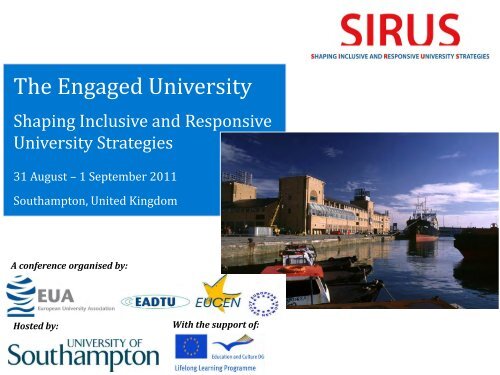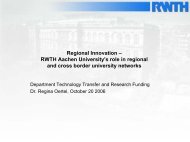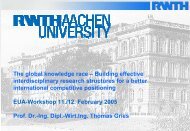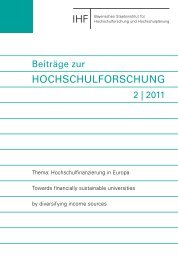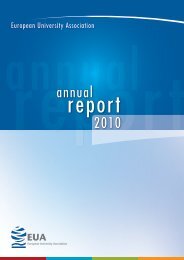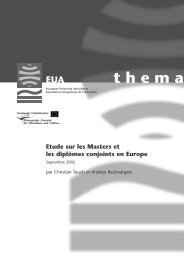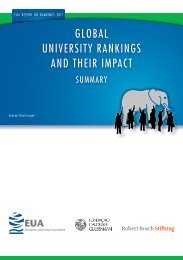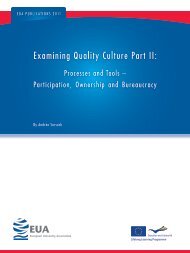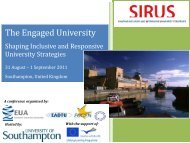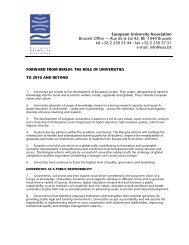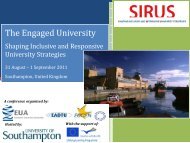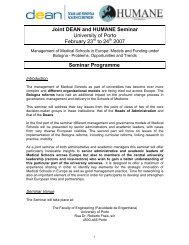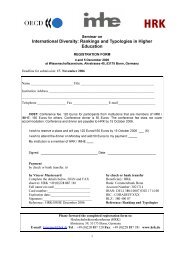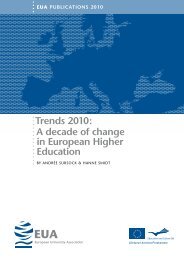Helena Nazaré - European University Association
Helena Nazaré - European University Association
Helena Nazaré - European University Association
Create successful ePaper yourself
Turn your PDF publications into a flip-book with our unique Google optimized e-Paper software.
The Engaged <strong>University</strong><br />
Shaping Inclusive and Responsive<br />
<strong>University</strong> Strategies<br />
31 August – 1 September 2011<br />
Southampton, United Kingdom<br />
A conference organised by:<br />
Hosted by:<br />
With the support of:
The Engaged <strong>University</strong><br />
Southampton, UK, 31 August – 1 September 2011.<br />
Regional Engagement: <strong>University</strong> of Aveiro, Portugal<br />
The Engaged <strong>University</strong>: Diverse approaches to lifelong<br />
Maria <strong>Helena</strong> <strong>Nazaré</strong><br />
Former Rector Universidade de Aveiro<br />
Portugal<br />
learning in the <strong>European</strong> Knowledge Society
Demographics (and other challenging) Issues<br />
• Workforce (re)qualification<br />
• Integration of immigrants<br />
Revisit <strong>University</strong> Mission ( Aveiro <strong>University</strong> )<br />
•Think Globally and act Locally (???)<br />
• From Ivory Tower, trough Oil Well into Watch Tower<br />
to become a Light House; Universities CANNOT stay<br />
aloof of societal challenges?!<br />
The Engaged <strong>University</strong><br />
Southampton, UK, 31 August – 1 September 2011.
World Population 2010 – 6,909 billion<br />
1.300 Mill. - 701 Mill.<br />
700 Mill. - 251 Mill.<br />
250 Mill. - 101 Mill.<br />
100 Mill. - 71 Mill.<br />
70 Mill. - 31 Mill.<br />
< = 30 Mill.<br />
The Engaged <strong>University</strong><br />
Southampton, UK, 31 August – 1 September 2011.
2010<br />
+ 2.2 billion<br />
The Engaged <strong>University</strong><br />
Southampton, UK, 31 August – 1 September 2011.<br />
Europe’s population<br />
(- 42 million)<br />
2050
% AG<br />
2010<br />
2050<br />
0 -14 15 - 24<br />
25 - 59; 60+
Demographics: (It’s happening NOW!)<br />
The Engaged <strong>University</strong><br />
Southampton, UK, 31 August – 1 September 2011.<br />
Over the next decade the percentage of the population over the age of 60<br />
will grow to over 30% to 40% in the U.S., Europe, and parts of Asia.<br />
Ageing populations present workforce challenges (qualification) and<br />
need higher support from the public purse (health and pensions).<br />
Global disparities in wealth and economic opportunity are driving<br />
population migration, resulting in growing immigrant and minority<br />
populations that both diversify and challenge existing cultures,<br />
economies, and politics (education).<br />
The gap between the very rich and the very poor is widening. Better and<br />
stronger policies for improvement of social inclusion and cohesion are<br />
needed.
The Engaged <strong>University</strong><br />
Southampton, UK, 31 August – 1 September 2011.<br />
The Knowledge Economy: (Demographics are challenging KE)<br />
Depends upon the creation and application of new knowledge and<br />
hence upon educated people and their ideas.<br />
The strength, prosperity, and welfare of a nation in a global<br />
knowledge economy demand a highly educated citizenry enabled<br />
by the development of a strong system of tertiary education.<br />
Able to deal with 20 years old but as well as with the<br />
qualification and requalification of older generation of actives.<br />
It also requires world-class research institutions with the<br />
capacity to discover new knowledge and transfer it into the<br />
marketplace.
Further challenges<br />
The Engaged <strong>University</strong><br />
Southampton, UK, 31 August – 1 September 2011.
In the EU 27, the 20-<br />
24 age group will<br />
decrease by 23.3%<br />
in 2050<br />
PT<br />
IR<br />
Spain<br />
UK<br />
FR<br />
BE<br />
NL<br />
DK<br />
NO SW<br />
GE<br />
IT<br />
CZ<br />
PL<br />
SK<br />
HU<br />
YU<br />
MK<br />
LT<br />
Lv<br />
FL<br />
BG<br />
The Engaged <strong>University</strong><br />
Southampton, UK, 31 August – 1 September 2011.<br />
RO<br />
BY<br />
UA<br />
MD<br />
20-24 cohort<br />
Figures range from -36%<br />
in Hungary to -60% in<br />
Bulgaria
Global Challenges === Threats to Democratic Societiy?!<br />
• Economic and finantial meltdown caused by the banking<br />
sector in 2008 is turning into a global economic crises.<br />
Could it have been otherwise? ( Ethics plus nformation turned<br />
into Knowledge)<br />
Fears about nuclear power may lead to a deep energy<br />
crises.<br />
Could it/Can it have been avoided ? (Geological information<br />
was/is available)<br />
The Engaged <strong>University</strong><br />
Southampton, UK, 31 August – 1 September 2011.
Knowledge Society<br />
Demographics<br />
Change in the<br />
educational needs<br />
Values of Citizenship<br />
The Engaged <strong>University</strong><br />
Southampton, UK, 31 August – 1 September 2011.
The Engaged <strong>University</strong><br />
Southampton, UK, 31 August – 1 September 2011.<br />
Challenges for Higher Education. Systems and Institutions.<br />
Are they too heavy?<br />
The need to dramatically broaden participation in higher<br />
education to build a competitive workforce. Tertiary and Pos<br />
Graduate. Continuing and Life Long. Integrate minorities and build<br />
inter geracional bridges.<br />
Build world-class research Universities. Competition for brains is<br />
getting tougher. Need to examine the rationale. Cream needs<br />
milk.<br />
Maintain parity of esteem among HE Institutions. Are there cases<br />
of same umbrella Institution?<br />
Increasing demands on an already stretched public purse due to<br />
health care, retirement, and security!
The idea of <strong>University</strong> needs Changing?!<br />
<strong>University</strong> must have a segmented mission and a clear vision<br />
Research.<br />
Education.<br />
Cooperation<br />
with society<br />
The Engaged <strong>University</strong><br />
Southampton, UK, 31 August – 1 September 2011.<br />
Became, not only producers and imparters of knowledge but drivers of<br />
innovation and a part of the fabric of a knowledge based inclusive society at<br />
regional level. Make the research results relevant for our next door neighbour!<br />
Respond to the shifting needs of labour market. Network to fight<br />
unemployment and retrain actives . Use the <strong>University</strong> tool box.<br />
Equity<br />
Innovation<br />
L L L
The hurdles:<br />
The struggle for excellence. A old fashioned idea<br />
of <strong>University</strong>.<br />
Rankings. Conflict of interests?<br />
Do Universities have the appropriate Instruments?<br />
Who pays for it?<br />
Ensuring Quality.<br />
The Engaged <strong>University</strong><br />
Southampton, UK, 31 August – 1 September 2011.
Ideas to help the front runners:<br />
Plan but use flexibility. Leadership matters and Champions<br />
are needed<br />
Emphasis on the public service side of LLL. Involve the<br />
region.<br />
Not everybody can or should do it. Reward good<br />
performance. Parity of esteem – is it possible?<br />
Look into the <strong>University</strong> tool box.<br />
The Engaged <strong>University</strong><br />
Southampton, UK, 31 August – 1 September 2011.
Where is Aveiro? Center<br />
of the world!
Center of the<br />
world?<br />
Perhaps Not!<br />
The Engaged <strong>University</strong><br />
Southampton, UK, 31 August – 1 September 2011.
The Engaged OECD Conference <strong>University</strong><br />
Southampton, Higher UK, Education 31 August in – Cities 1 September and Regions. 2011.<br />
The Context at National and Regional<br />
level<br />
Political and administrative: 5 + 2 regions, 18 districts. Little<br />
autonomy from central government. Ex: Education, Health<br />
and Justice.<br />
Demography: Total of 11 million residents. Region centre<br />
with 2.3 million of which 750 thousand are in the Aveiro<br />
district.<br />
Economy: The region centre represents 20% of the national<br />
GDP. Major sectors are tourism, ceramics, food, electronics &<br />
telecomunications, shoes, automobile parts and<br />
metalomechanics. SME’s mainly with a few multinationals<br />
and more than 98% of the firms having less than 10 workers.<br />
The Aveiro lagoon (Ria de Aveiro) is of great importance in<br />
the economy of the region.<br />
Higher Education: HE is binary system made of <strong>University</strong><br />
(15 pub + 40 priv) and of Politechnic Education (20 pub + 61<br />
priv). In 2008-09 there were 373,002 students enrolled in HE<br />
(282,432 attending public institutions and 90,809 private<br />
ones). 1.6% of GDP was invested in HE (2009).<br />
PORTUGAL; AVEIRO
We can aford diversity within!<br />
The <strong>University</strong> of Aveiro (UA) founded in<br />
1973 is located between two of the most<br />
prestigious Portuguese universities, the<br />
eight hundred years old Coimbra<br />
<strong>University</strong> about 50 kilometres to the<br />
south of Aveiro and the <strong>University</strong> of Porto<br />
towards the North, at about 100<br />
kilometres. Hence, even with an<br />
expanding system as we had 37 years<br />
ago, the situation was not very promising.<br />
Now we are a well reputed university<br />
integrating university departments and<br />
polytechnic schools with excellent<br />
performance research wise and catering<br />
(2010/2011) for 14768 students.<br />
Açores<br />
Madeira<br />
Minho <br />
Porto <br />
Aveiro <br />
Coimbra <br />
Lisboa <br />
UTL <br />
UNL <br />
Aberta <br />
<br />
Évora<br />
Algarve<br />
UBI<br />
<br />
UTAD
<strong>University</strong> of Aveiro<br />
Total nº of registered students (2010/011): 14768<br />
<strong>University</strong>:<br />
Undergraduate (1 st Cycle): 4567<br />
integrated masters: 2431<br />
post-graduate (Msc, PhD) 3787<br />
Pol. Schools:<br />
The Engaged <strong>University</strong><br />
Southampton, UK, 31 August – 1 September 2011.<br />
Undergraduate (1 st cycle): 2424<br />
post-graduate (professional master): 304<br />
post. secondary: 1050<br />
Teaching Staff: 1000
What do we have in our tool box:<br />
The Engaged <strong>University</strong><br />
Southampton, UK, 31 August – 1 September 2011.<br />
• Matrix organisation and Strong centralised<br />
“tradition”<br />
• Bologna tools. (Not as much as we could!)<br />
• Diversity within. Pride in being as we are.<br />
• Cooperation with the region of long standing.
Strategic selection of scientific domains<br />
1970’s<br />
Telecommunications.<br />
Materials Science<br />
Teacher Training<br />
Environmental Sciences<br />
& Engineering. Regional<br />
Planning<br />
Biotechnology<br />
Biomedical Sciences<br />
Nanosciences<br />
Medicine (à la Imperial)<br />
Regional Impact<br />
CTT, PT… Telecom cluster<br />
Ceramics. Tiles, China and pottery<br />
Integration of migrants, LLL,…<br />
The Lagoon and the Coastal area.<br />
Tourism, sustainable devellopment,<br />
biodiversity….<br />
Food<br />
etc
“Post-secondary Education” in Portugal<br />
Profession oriented programmes after completion of secondary<br />
education - Technological Specialisation Courses (CETs)<br />
Aim: promoting a training path that combines qualification and<br />
professional skills and competences with the possibility of<br />
proceeding to higher education<br />
Those successfully completing this type of training are awarded a<br />
level 4 vocational qualification certificate<br />
Delivered in partnership<br />
The Engaged <strong>University</strong><br />
Southampton, UK, 31 August – 1 September 2011.
More Education to more people:<br />
Widening oportunities<br />
The Nacional Context:<br />
• older than 23 years (since 2006/2007) (local<br />
examination entry)<br />
• via Technological Specialisation Programmes – CETs,<br />
• Holders of a HE diploma.<br />
The Engaged <strong>University</strong><br />
Southampton, UK, 31 August – 1 September 2011.<br />
• Requalification programmes for nurses and primary<br />
school teachers. ( Short degree holders~2 years)
EDUCATION<br />
(Fighting unemployment; Retraining actives; integrating<br />
migrants)<br />
Leading the Change<br />
UA model incorporates <strong>University</strong><br />
Departments and Polytechnic Schools (1st<br />
school in 1997). Strong support from the region.<br />
In 2003 the needs of the region in terms of<br />
qualification of the work force, were discussed.<br />
New legislation was passed and a programme<br />
aimed at post-secondary education was started<br />
under the leadership of the Rectorate; the<br />
programme is now run by the Polytechnic<br />
Schools. Strongly supported by the District and<br />
Municipalities. Difficult to get green light from<br />
the Senate.<br />
School of Design and Technology – ESAN.<br />
School of Technology and Management –<br />
ESTGA. School of Health – ESSA. Institute<br />
of Accountancy – ISCAA
CONCLUSIONS<br />
All Universities share the responsability to contribute in the<br />
process of dealing with the XXI century’s social challenges:<br />
The region where the university is located should feel the<br />
benefit of that action ( use the “Universty tool box” to do more<br />
for the bulk of the population).<br />
Contribute to the public understanding of science<br />
Educate sustainability aware citizens<br />
Informing public policies<br />
Glion Colloquium 2011<br />
Global Sustainability and the role of Universities.<br />
Leadership matters<br />
Not a single model of university. Segmented mission and<br />
clear vision
Light House
the <strong>University</strong> of Aveiro as a<br />
trigger for networking and a<br />
driving force for a learning region


